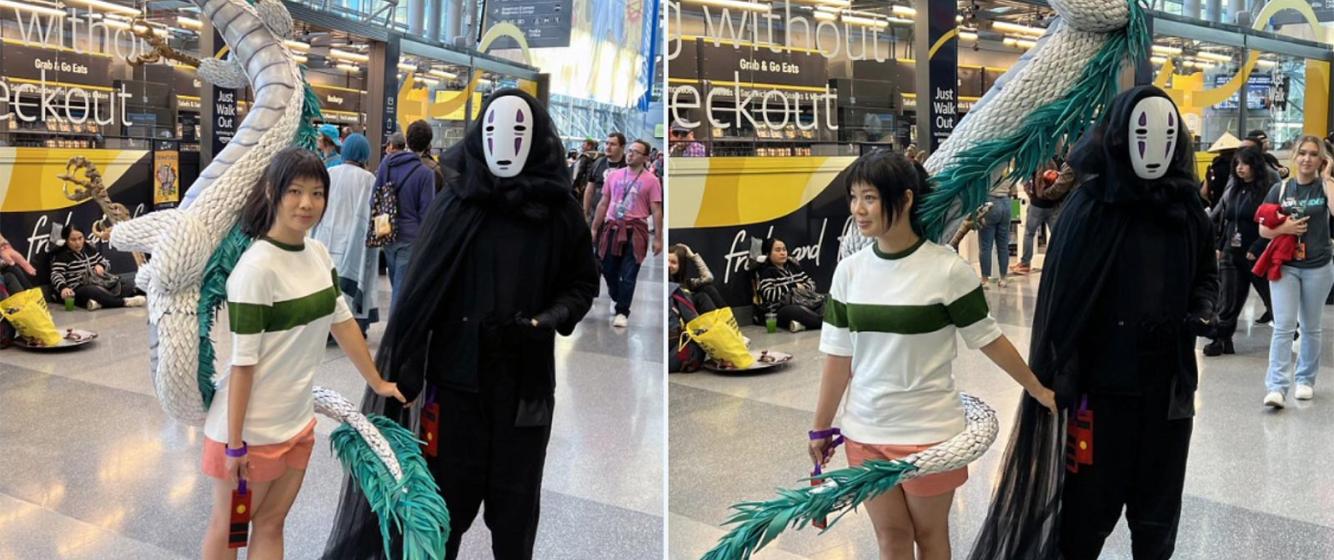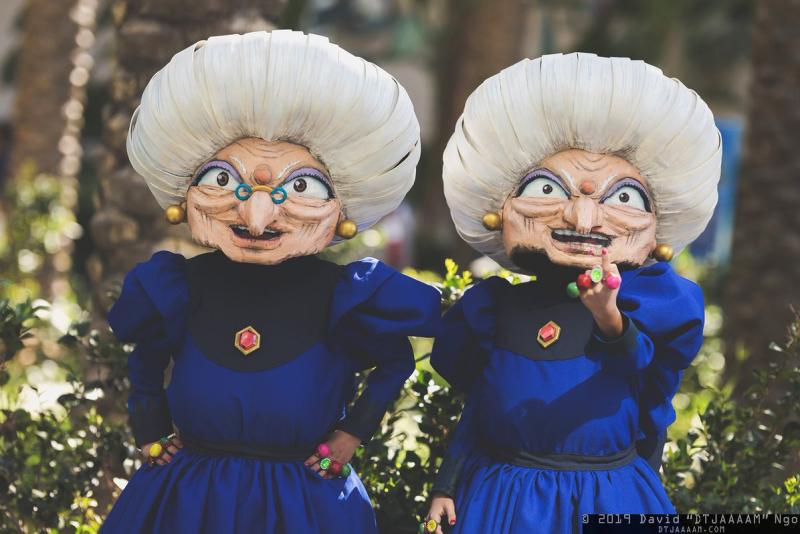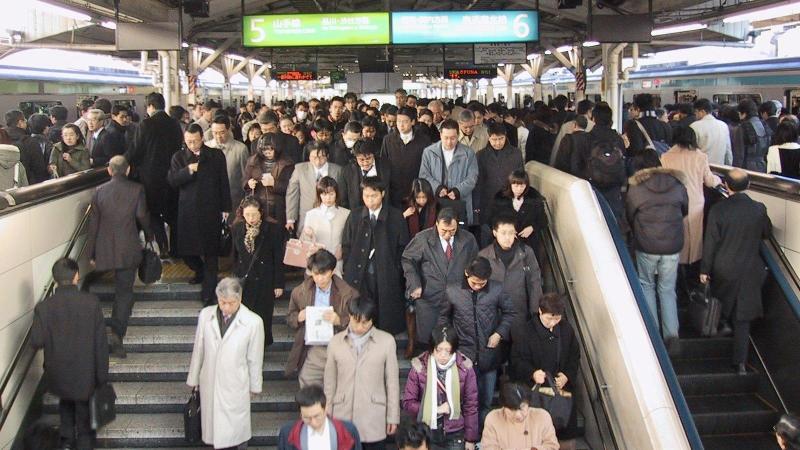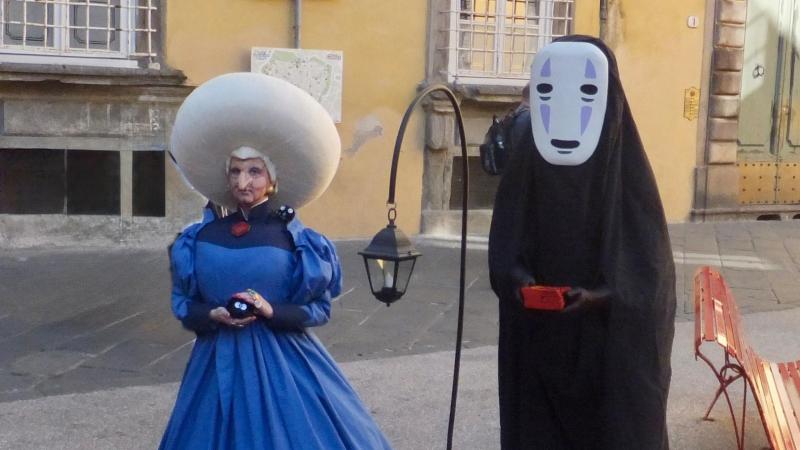
Spirited Away (2): Power and Moral Choices for Gen Z
This is part two of a deep analysis of Spirited Away (2001).
For part one, click here.
The Story
I enjoy teaching a college course about anime and manga because my students teach me so much. Spirited Away (2001) connects strongly with Generation Z - people born around or after 2000. These students grew up in a competitive world, so they have unique insights about the movie.
The movie tells the story of Chihiro, a 10-year-old girl who finds herself stranded in a magical world. While moving to a new home with her parents, they discover what looks like an empty theme park. Her hungry parents decide to eat food from a deserted restaurant. But this simple action turns them into pigs. Chihiro learns she is now trapped in a spirit world where humans don't belong.
To survive and save her family, she must work at a huge bathhouse that serves Shinto kami (Japanese religious spirits). The bathhouse is run by Yubāba, a powerful witch who cares only about money. Chihiro's journey from a scared child to a brave young teenager forms the heart of the story. Over twenty years later, this tale still reflects the real challenges that young people face when they enter the adult world of work and responsibility.
Beyond Simple Survival: Learning to Navigate Power
My first analysis showed how Spirited Away works as a survival guide for Japan after its economic bubble burst. But my students see something more complex in Chihiro's journey. They see not just economic survival, but learning to understand different types of power and moral complexity in a gray adult world.
One of my students Kat (who I keep mistaking her name - a running joke in the class), shared her experience:
The first time I watched Spirited Away, I was mostly amazed by how weird and beautiful it was. It felt like being dropped into a dream with its own rules. But when I watched it again, especially after thinking more about post-bubble Japan and what Miyazaki might be responding to, I started seeing it differently. I saw it less as a fantasy and more as a quiet survival story.
But beyond survival lies a more complex challenge. The challenge is understanding that power structures aren't simply good or evil. Moral choices exist within complicated systems where everyone is trying to survive.
Why the movie is not a simple case of Good and Bad
One of the most striking things about Spirited Away is how it refuses simple moral categories. In past years, I usually taught Yubāba as the villain and Zeniba (her sister who lives quietly in the woods) as the "good" sister. But Nancy, one of my students, pointed out how this movie doesn't actually present clear "good guys" and "bad guys." Yubāba is demanding and often cruel. She treats her workers harshly. She cares only about money and power. Still, Yubāba also provides jobs to hundreds of workers who desperately need work. Without her bathhouse, these workers would have nowhere to earn money. She offers important services to her spirit customers. The spirit community would lack an important institution.
Zeniba seems kinder. She welcomes visitors, teaches them to knit, and creates a peaceful environment. But while she has found personal peace, she has basically chosen not to engage with the world's problems. She doesn't help anyone escape difficult situations or work to improve conditions for others. Does she really contribute to society? Or has she simply found a comfortable way to avoid responsibility? How different is she from a NEET (not in education, employment, or Training) who has withdrawn from society, or hikikomori (shut in)?
Short clip on NEET in Japan
This moral complexity reflects what young people face today. They encounter systems that aren't clearly good or evil, but rather something more complicated. Even institutions such as a company with poor working conditions serve important functions. The film asks viewers to think beyond simple moral judgments and consider how change happens within imperfect systems.
The Bathhouse as "Black Kigyo"
The bathhouse represents modern jobs and companies in a way that feels very familiar to anyone who has worked in a demanding environment. Workers live in small, crowded rooms and work long hours for little money. Everyone competes with each other while the boss Yubāba lives in luxury. The bathhouse operates around the clock, serving demanding customers.
What's particularly striking is how the bathhouse mirrors many modern workplace problems in Japan. The environment is stressful, hierarchical, and focused mainly on making money rather than taking care of people. Japanese youth today would call it a "black kigyo" (black company). This term was created in the 2000s to describe a company that exploits its employees. Black kigyo are white collar companies with poor working conditions, long hours, low pay and pawa hara ("power harassment"). This means bosses emotionally break down their workers.
You can see a simulation of a Black kigyo working conditions in this video documentary
Yet the bathhouse, like a black kigyo, also provides structure and purpose. Workers who may have no other job opportunities can develop skills and earn money. It's not entirely different from many real workplaces. People complain about conditions but still depend on their jobs for survival. The film doesn't suggest that work itself is bad. Rather, it suggests that the way work is organized can either support human dignity or destroy it.
The Dangers of Extremes: Too Much vs. Too Little
The movie's characters mirror workers in a black kigyo. Haku, Yubāba's apprentice, represents management trapped by the system they serve. He has lost his original identity and does Yubāba's dirty work, including stealing from Zeniba. Yet he still tries to protect Chihiro.
His actions show that ethical choices remain possible even within unsavory positions.
Rin, the senior worker who first guides Chihiro around the bathhouse, represents the experienced employee who knows the system's flaws but remains trapped by economic necessity. She wants to leave but has no alternatives.
Rin guides Chihiro around the bathhouse from this official clip from the movie
However, her relationship with Chihiro reveals her capacity for mentorship and care within an uncaring system.
Miyazaki also shows the workers in the boiler room. Kamaji, the spider-like boiler room operator, has become almost part of the machinery he tends. Yet he hasn't lost his humanity. He represents workers who maintain their dignity and kindness despite being worn down by repetitive labor. The soot sprites he oversees are treated like machines rather than beings. But when Chihiro interacts with them respectfully, they respond with personality and playfulness. This suggests that even the most dehumanized workers retain their essential humanity.
Miyazaki explores how both wealth can also corrupt human development. Boh, Yubāba's giant baby son, represents the spoiled wealthy elite. His abundance has made him emotionally stunted and unable to cope with any challenge or frustration. When he leaves his luxurious room to live simply with Zeniba, he discovers the satisfaction of enjoying simple life rather than just over-consuming. His transformation suggests that some struggle and limitation might be necessary for personal growth. No-Face demonstrates how environments shape behavior. In the competitive, money-focused bathhouse, he becomes a consuming monster. He creates fake gold to buy attention and validation. But when Chihiro takes him to Zeniba's peaceful cottage, he returns to his gentle nature and learns to find satisfaction in quiet contribution. His character development illustrates that people's worst behaviors often reflect their circumstances rather than their essential nature.
How Chihiro Succeeds
What makes Chihiro special is not that she's the strongest or smartest person in the bathhouse. Instead, she succeeds through qualities that anyone can develop. Chihiro wins not by fighting or being the strongest but by being kind to everyone she meets and treating them with respect. She adapts to new situations while staying true to herself. She understands emotions (she sees that No-Face is lonely, not just dangerous) and helps her friends who are in danger like Haku, even when it's difficult or dangerous.
Her approach to the river spirit demonstrates this perfectly. When a heavily polluted smelly spirit arrives at the bathhouse, most workers are disgusted and want to get rid of him quickly. But Chihiro, initially forced to clean him because of her low rank, works hard to remove the pollution and trash that has been trapped in his body. She doesn't do this for a reward, but because she recognizes his suffering and wants to help. This act of genuine care transforms not only the spirit but also changes how other workers see both the spirit and Chihiro herself.
Similarly, with No-Face, Chihiro sees past his frightening exterior to understand his core problem. While others focus on the gold he produces or fear his destructive power, Chihiro recognizes that he's lonely and doesn't know how to connect with others. Instead of rejecting him or trying to profit from him, she offers friendship. This approach helps No-Face rediscover his true nature and find peace.
Chihiro's Model: Power Through Connection, Not Domination
This approach represents a different model of power based on empathy, connection, and seeing through surface appearances. In a world of exploitative bosses and desperate workers, Chihiro demonstrates that individual actions can create ripples of positive change. This doesn't require someone to overthrow entire systems.
Many young people today face similar problems including job insecurity, economic inequality, pressure to succeed at any cost, and risk of losing their identity in demanding work. Perhaps Spirited Away speaks to them even more in this age of downward mobility. The movie teaches that you can't change the whole system alone, but you can make your immediate environment more human. In other words, as many Japanese learned, don't abandon the community ties even in the face of relentless work conditions. Whether this is good or bad way to change the system, I leave it up to you. You may want to watch this short piece on black kigyo.
Spirited Away as a Guide for Generation Z
As Kat observed:
It makes me wonder if Miyazaki is intentionally avoiding a clean moral hierarchy. Maybe it's not about who's right or wrong, but about showing how different kinds of power operate. Maybe survival, especially for someone like Chihiro, means learning to see through all of it. Yubāba, Zeniba, No-Face - they're all products of their own settings. Chihiro is the only one who actually moves between them, and that mobility gives her perspective.
This mobility (both physical and moral) becomes Chihiro's greatest strength. She adapts to each environment while maintaining her core values. She learns to work within flawed systems while never losing sight of her humanity or that of others.
For Generation Z, facing their own complex institutional challenges (from climate change to economic inequality to technological disruption), Spirited Away years later offers a model that goes beyond simple resistance or acceptance. Chihiro's example teaches us that we can adapt to challenging and dehumanizing situations while keeping our core values and treating others with dignity and respect.
As another student, Ashley, commented, the film is ultimately about "adapting without disappearing." As seen in the movie, Chihiro must avoid disappearing and hold onto her identity if she is to rescue her parents and escape the spirit world. The movie teaches that while you can't change entire systems alone, you can make your immediate environment more humane and maintain your essential humanity. In other words, Spirited Away remains timeless because it offers hope without false promises. Chihiro shows us that real power comes from empathy, not dominance. In our complex world, we can't fix everything—but we can stay human, help others, and create positive change wherever we are.
Discussion Questions
- What qualities help Chihiro succeed in the spirit world, and how do they differ from traditional “heroic” traits?
- How does Spirited Away show that power can come from empathy instead of control?
- Who do you think is more morally responsible: Yubāba, who runs an exploitative system but offers jobs, or Zeniba, who is peaceful but disengaged from society? Why?
- Do you think Chihiro’s “small acts of kindness” can actually create change in real-life systems like schools, jobs, or politics?
- Chihiro changes not by running away from the system but by learning to move within it without losing herself. Have you ever felt pressure to fit into a system or environment that challenged your values? How did you respond?



Comments
Meow
🐈⬛🐈🐱🐈🐈⬛
Add new comment